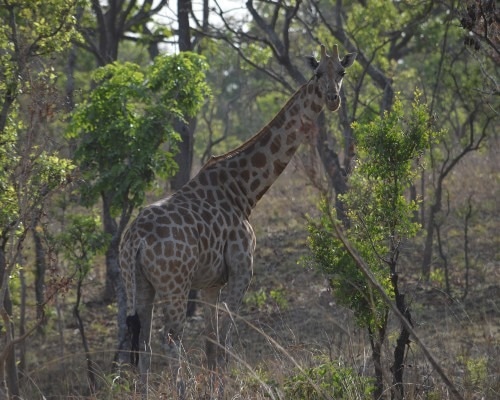Without intervention, poaching of two Critically Endangered Kordofan giraffes might likely result in extinction in just 15 years within Cameroon’s Bénoué National Park. The research was carried out by the Bristol Zoological Society and the University of Bristol.
 Kordofan giraffe. Image Credit: University of Bristol and Bristol Zoological Society
Kordofan giraffe. Image Credit: University of Bristol and Bristol Zoological Society
The study was published in the African Journal of Ecology.
There are currently believed to be fewer than 50 Kordofan giraffes remaining in the Bénoué National Park in Cameroon, one of the last remaining populations in existence. Since 2017, the Bristol Zoological Society has been working to protect this critically endangered mammal.
Although poaching is frequently held liable for population decline, there is little research into its overall effects and the evidence is mainly anecdotal. In addition to killing giraffes for their meat, illegal hunters also take them for their bones, hair, and tails, which are highly prized by some cultures.
Using a population modeling technique, investigators from Bristol Vet School and Bristol Zoological Society sought to evaluate the efficacy of various conservation measure interventions. The team contrasted habitat protection, population supplementation, and anti-poaching interventions. Each intervention was simulated separately and in combination to test their relative effects on population viability.
According to their modeling, it would take just 15.3 years on average for giraffes to go extinct if one male and one female were killed each year. The viability of the population was significantly impacted more by the poaching of female giraffes than by that of males.
The team’s findings support the idea that strengthening current anti-poaching efforts should take priority over conservation management, along with safeguarding wildlife corridors to promote dispersal.
Our findings confirm anti-poaching measures appear the most significant for population viability. The extent of poaching in Bénoué National Park is still unclear as far higher giraffe poaching rates have been reported in other national parks, but recent confirmed reports of the poaching of two giraffes in a period of just three months highlight the urgency of conservation intervention.
Kane Colston, Study Lead Author, Bristol Veterinary School, University of Bristol
Kane Colston undertook the study as part of his Master’s degree at Bristol Vet School along with teaching partners at the Bristol Zoological Society.
These findings really underscore the magnitude of the threat facing Bénoué National Park's Kordofan giraffe and highlight the importance of our conservation work in the area. We will continue to work with the park’s Conservation Service and our partner NGO Sekakoh to ensure anti-poaching initiatives are prioritized within the landscape.
Dr. Sam Penny, Project Lead, Bristol Zoological Society
Journal Reference:
Colston, K. P. J., et al. (2023) Viability analysis of Kordofan giraffe (Giraffa camelopardalis antiquorum) in a protected area in Cameroon. African Journal of Ecology. doi.org/10.1111/aje.13196.